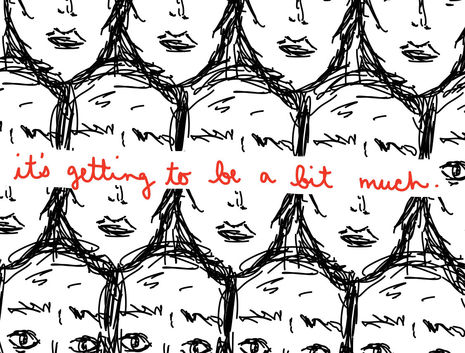Addiction: narratives and ownership
Columnist Jesi Bailey explores the consequences of watching a loved one deal with addiction

In Alcoholics or Narcotics Anonymous meetings, you begin by introducing yourself. An addict says their name and their addiction. “My name is Mark, and I’m an alcoholic.” When you’re attending in support of a loved one, you say your name and relation to them. I spent many years identifying myself in this manner. “I’m Jesi. I’m ___’s family member.” I am keenly aware that of the two options, this is the more comfortable role to be in. I just wish it didn’t stick so tightly to my psyche.
“Even writing this feels selfish, like this isn’t my story to tell”
Even now I seem to think of myself in this manner, my identity as someone who loves an addict internally prioritised over my existence as a person alone. Exhibit A: Earlier this year, I stopped sleeping. By the end of it I was swaying dangerously every time I stood up, incapable of focusing or holding a conversation, but I still couldn’t bring myself to lay down and face the bad dreams I was having again. I’ve always known that the only way to make my nightmares stop is to talk about them. But I wasn’t dreaming about myself alone, and to describe to anyone the memories I was reliving in my sleep would entail disclosing the secrets and behaviours of someone who was in active addiction at the time I experienced them. I was awake for 81 hours before the exhaustion finally collapsed me, sending me into a full day of fitful sleep. Even then, the dreams didn’t stop - I was simply too tired to force myself awake from them.
I want to sleep without all of my unsaid words coming back to haunt me when I’m most vulnerable, but justifying the cost often feels impossible. Even writing this feels selfish, like this isn’t my story to tell. But the reality is that addiction does not exist in a vacuum, affecting solely the person experiencing it. There were experiences I should not have had to live, things that were done to me as a result of loving someone who was not in a mindset to prioritise my wellbeing over seeking out their vices. I was there, too - and I watched and empathised and forgave because of course that is what you do when the person you love is trying to get sober.
But I can’t talk honestly about what happened to me without talking about them too, without speaking of the ugly things they did that they would prefer went unmentioned. And I’m sorry about that, truly - I wish more than anything that I could unknot those narratives, to pick everyone else out and speak about myself alone. Yet I also think maybe I’ve earned some selfishness of my own, if only to grant myself the ownership over my life and the experiences that made me into who I am now.
“For a long time, I was collateral damage”
I know, perhaps better than most, that addiction is a brutal disease, and I have the greatest sympathy and respect for those who battle it. I also know that the person who hurt me is not the same person who got sober, the person I love deeply. This does not change the fact that my abuse came from the hands of an addict, not an addiction. I can understand that the actions which hurt me were inflicted by a different person than the sober person who exists today. That doesn’t mean I don’t struggle to look at the same face sometimes. And besides - who does that leave me to be angry with? If the one who abused me doesn’t exist anymore, where do I place that hurt? It feels like raging against a ghost, and no one likes when you speak ill of the dead.
For a long time, I was collateral damage. It was unintentional, and impersonal to me; I was irrelevant in the internal war of my loved one and their addiction, simply caught in the crossfire of it. And without question or hesitation I would do it again if it was the only way to get them to the place they are now. If the price of my sleepless silence is their sobriety, I will never write again. But I’m hoping there might be a middle ground somewhere, even if the loudest parts of my head are telling me that my only words on the subject should be my name and relationship to the one I love. Here is what I’m trying now: I introduce myself as my own person. I call my therapist. I start to open up about what I lived through, even if a sting of betrayal stays with me. But at least I am sleeping through the night.
 News / Colleges charge different rents for the same Castle Street accommodation2 March 2026
News / Colleges charge different rents for the same Castle Street accommodation2 March 2026 News / King’s hosts open iftar for Ramadan3 March 2026
News / King’s hosts open iftar for Ramadan3 March 2026 Theatre / Lunatics and leisure centres 4 March 2026
Theatre / Lunatics and leisure centres 4 March 2026 News / Angela Merkel among Cambridge honorary degree nominees27 February 2026
News / Angela Merkel among Cambridge honorary degree nominees27 February 2026 News / News in Brief: waterworks, wine woes, and workplace wins 1 March 2026
News / News in Brief: waterworks, wine woes, and workplace wins 1 March 2026








